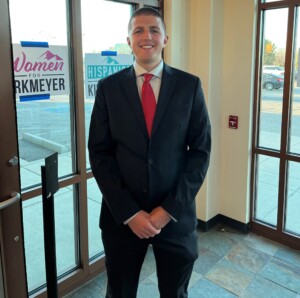“I do not consider Autism/Asperger’s to be a disability but rather a brain that functions differently from the neurotypical brain,” says Beau Shenkenberg, who was diagnosed at two with the then-termed Asperger’s syndrome.
In 2013, Asperger’s syndrome was absorbed into the encompassing diagnosis of Autism Spectrum Disorder.
Specifically, those with a diagnosis of Asperger’s would now be considered to have Level 1 ASD.
Quite frequently in the media, autism is referred to as a disability.
Though the Autist may have various impairments, this doesn’t always mean they are disabled in terms of being unable to live independently.
Though Beau, who is a former legislative aide, has a condition that’s deemed a developmental disability by the American Psychiatric Association, this doesn’t mean he’s “disabled.”
A more accurate way to view this is that he has an innate condition that, for some others, impedes their ability to live independently and be self-sufficient.
“In my life, I have always been able to be social without having too much difficulty understanding what other people are saying,” says Beau.
“Issues I do have when it comes to social interaction and conversation is when neurotypicals use sarcasm, idioms or other allistic [non-autistic] gestures that autistic people often don’t understand.
“The only reason that having autism is challenging for me is how society is designed for neurotypicals.”
Yes, society is structured for the NT brain. Imagine for a moment, though, that we were all transported to Planet Vulcan – the fictitious world in the “Star Trek” universe.
For those unfamiliar with this alien humanoid species, Vulcans are taught in early childhood to suppress their emotions and rely heavily on logic for making decisions great and small.
However, anyone who’s ever watched any of the Star Trek franchises knows that Vulcans neither get nor use sarcasm; never engage in small talk; and excel at instantaneous calculations of time count-downs, mathematical odds and other numerical data.
Autistics would fit smoothly in a Vulcan society, while neurotypicals would struggle.
“I have not only faced challenges socially, but academically and in the workplace due to the neurotypical structure and expectations of society,” says Beau.
“I have always felt that autism is a natural state of being with a different way of perceiving the world.”
How does a neurotypical world disable an autistic person?
Beau explains, “The reason that a neurotypical society disables high functioning autistic adults is because people designed society around the neurotypical brain.
“Any type of thinking that is not neurotypical or standard to society’s expectations is considered to be disorders that need to be cured.”
This reminds me of the story I read about a young autistic child who was able to focus best on his teacher’s storytelling by lying on his stomach and looking away from her.
This went unaccepted until one day he was allowed to do this, and was able to retell a story with great accuracy.
In an NT world, we must all sit prim and proper, watching the teacher.
Sure, this is necessary if we must see what they’re writing on a chalkboard.
But if it’s just a matter of listening to them explain something or tell a story, why must students face and watch them, when for some, focus is optimized by looking outside the window or – as odd as it seems – lying on the floor?
Autistics are often viewed as “weird.” But let’s face it: Many of history’s greatest thinkers were considered odd or strange by their contemporaries.
“Many neurotypicals oftentimes have an implicit bias towards neurodiverse individuals, especially towards autistic people,” continues Beau.
“Neurotypical bias is a sociological issue since most neurotypicals are unaware of the different forms of neurodiversity.
“Historically, civilizations and societies are developed around common beliefs, ideologies and ways of thinking.
“Differences in thinking and ideology often cause wars and conflicts between different cultures, tribes and nations throughout history.
“In the modern day, the neurotypical/neurodivergent paradigm is caused by a lack of understanding and education into how these groups communicate and process information.”
The vast majority of people on this planet are NT. Neurodiversity also includes those with ADHD, OCD (obsessive compulsive disorder) and sensory processing disorder.
“Neurodivergents often face high underemployment and unemployment, as companies and jobs are designed around neurotypical functions and expectations,” explains Beau.
Instead, the skills that the Autistic can bring to a company should be appreciated instead of the job interviewer getting fixated on the autistic applicant’s reluctance to shake hands, sparse eye contact while answering questions or “outdated” hairstyle.
“Both neurotypicals and neurodivergents need to understand the other group’s communication style in order to create a society in which both groups can thrive.
“If the paradigm was the opposite for neurotypicals and neurodivergents, then neurotypicals would face the same issues affecting neurodivergents in society.”
Recall the aforementioned thought experiment in which NTs and Autistics are sent to Planet Vulcan.
The Autistics (and other neurodivergents, for that matter) would have more success than would the NTs.
Autism Comes with Strengths
“Strengths that my autism has given me is remarkable memory of facts about my favorite topics, an ability to think outside the box and hyperfocus on details neurotypicals often miss,” says Beau.
“I would say that my autism is a gift that is not being fully utilized due to society’s neurotypical structure.
“My dream is to one day find a job structured for the autistic mind so that I can reach my full potential and contribute to society and the world.”
 Beau Shenkenberg is a Denver, CO resident diagnosed with Asperger’s syndrome (now Level 1 ASD) at the age of two. He obtained a degree in political science from the University of Northern Colorado in August 2022.
Beau Shenkenberg is a Denver, CO resident diagnosed with Asperger’s syndrome (now Level 1 ASD) at the age of two. He obtained a degree in political science from the University of Northern Colorado in August 2022.
 Lorra Garrick has been covering medical and fitness topics for many years, having written thousands of articles for print magazines and websites, including as a ghostwriter. She’s also a former ACE-certified personal trainer. In 2022 she received a diagnosis of Level 1 Autism Spectrum Disorder.
Lorra Garrick has been covering medical and fitness topics for many years, having written thousands of articles for print magazines and websites, including as a ghostwriter. She’s also a former ACE-certified personal trainer. In 2022 she received a diagnosis of Level 1 Autism Spectrum Disorder.
Top image: Freepik.com
This content was originally published here.
